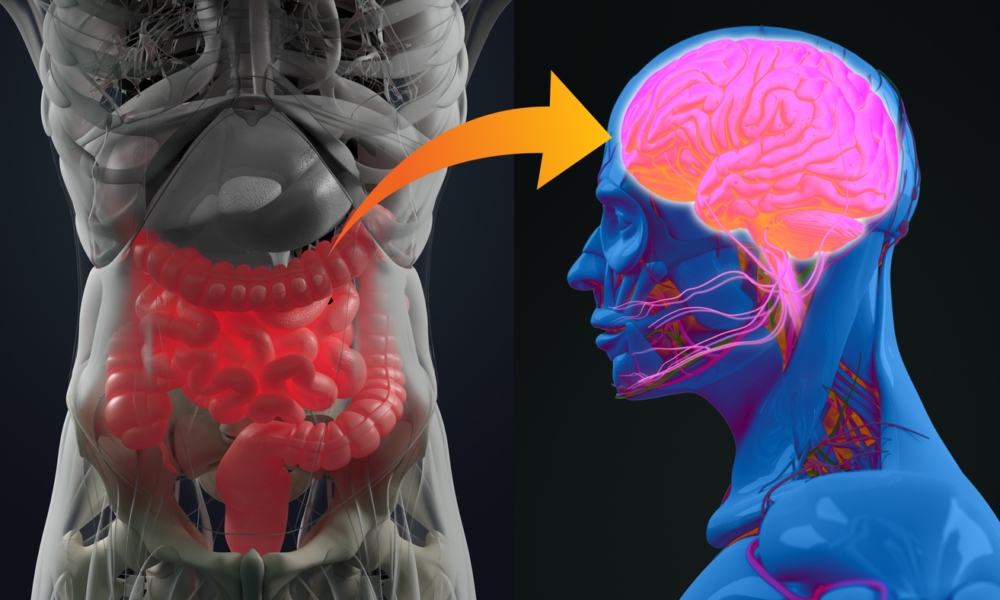
Tilting on the Gut-Brain Axis
The Gut-Brain Axis represents a complex communication network linking the central nervous system (CNS) and the gastrointestinal tract's enteric nervous system (ENS). This bi-directional pathway enables the brain to influence intestinal activities and, conversely, the gut to affect brain functions. It plays a pivotal role in maintaining homeostasis and influences everything from our digestion to our mood, underlining the profound impact of gut health on mental well-being. Through various mechanisms, including neuronal, hormonal, and immune system pathways, the gut-brain axis facilitates a dialogue between the brain and the gut microbiota, affecting emotional and cognitive health.
The significance of the Gut-Brain Axis in human health cannot be overstated. This relationship underscores the importance of a balanced gut microbiome for digestive health and mental well-being. Imbalances in gut microbiota can lead to an array of health issues, including digestive disorders, immune system dysfunctions, and even mental health problems like anxiety and depression.
Impact on Health and Disease
Disorders in this axis can manifest in numerous ways, linking gut inflammation or microbiome imbalances with an increased risk of neurological and psychiatric conditions, such as Alzheimer's disease, Parkinson's disease, autism spectrum disorders, and schizophrenia.
Conversely, stress and psychological factors can exacerbate gastrointestinal diseases like irritable bowel syndrome (IBS) and inflammatory bowel disease (IBD), highlighting the bidirectional nature of these relationships. This understanding opens new avenues for treating complex diseases by targeting the gut microbiome with specific dietary interventions, probiotics, and lifestyle modifications to restore balance within the gut-brain axis.
The potential for such interventions to improve mental and physical health marks a significant shift towards more holistic approaches in medicine, underpinning the importance of the gut-brain connection in the broader context of human health and disease.
Potential Therapeutic Approaches
Given the intricate connections between the gut and brain, several potential therapeutic approaches have emerged that focus on modulating the gut microbiome to improve mental and neurological health.
Additionally, lifestyle modifications such as stress reduction techniques, regular exercise, and adequate sleep are recognized for their positive impact on the gut microbiome and overall brain health. These therapeutic approaches underscore a growing recognition of the need for holistic treatment strategies that address the complex interactions between the gut and the brain in promoting optimal health and well-being.
Probiotics and Diet Modifications
Probiotics, often referred to as "good" bacteria, play a critical role in maintaining the balance of the gut microbiome, which, in turn, supports healthy brain function. Integrating probiotics through supplements or probiotic-rich foods like yogurt, kefir, and fermented vegetables can potentially mitigate symptoms associated with gut dysbiosis and its neurological impacts.
Diet modifications emphasizing high-fiber, nutrient-rich foods contribute to a diverse and robust microbiome, facilitating the production of beneficial metabolites and short-chain fatty acids crucial for brain health. Collectively, these dietary strategies offer a foundational approach for harnessing the gut-brain axis's therapeutic potential, underscoring nutrition's power in modulating mental and neurological well-being.
Stress Management Techniques
Effective stress management is key to maintaining a healthy gut-brain axis. Chronic stress can significantly disrupt the gut's microbial balance, affecting mental and physical health. Techniques such as mindfulness meditation, yoga, and deep breathing exercises have been shown to reduce stress levels and positively impact gut health.
Engaging in regular physical activity can not only lower stress but also promote a healthier microbiome. Cognitive-behavioral therapy (CBT) is another powerful tool that helps individuals change negative thought patterns that contribute to stress, indirectly supporting gut health. By incorporating these stress-reducing practices, individuals can foster a more harmonious gut-brain relationship, which is crucial for overall well-being.
Future Research Directions
Exploring the gut-brain axis opens new avenues for scientific inquiry, aiming to unravel the complex mechanisms underlying this connection. Future research might focus on identifying specific microbial strains with potent neuroprotective properties and understanding how they interact with the human host to influence mental and neurological health.
Longitudinal studies are needed to trace gut microbiota development from early life stages and its impact on the risk of developing neuropsychiatric and neurodegenerative conditions. Investigating the efficacy and safety of personalized microbiome-based interventions could also provide breakthroughs in treating various disorders associated with gut-brain axis dysregulation.
Advancing our understanding of this intricate relationship will enhance our grasp of human physiology and pave the way for innovative therapeutic strategies that promise to improve lives globally.
If you have more questions, feel free to contact Needham Gastroenterology Associates. Our experienced physicians are here to answer them or provide treatment if needed—schedule an appointment.